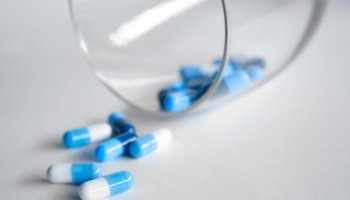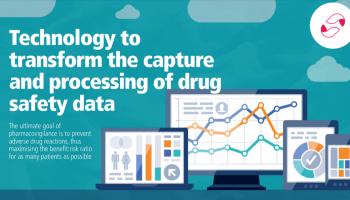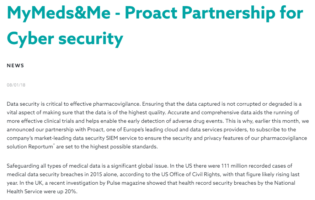The power of AI to transform healthcare and drug development, from making R&D more effective to establishing optimal treatment regimens, is universally acknowledged. But while there is no doubt that AI can analyse colossal amounts of data faster than humans to reveal patterns and predictions to enhance disease diagnosis, inform safety profiles, deliver more accurate clinical trials and enhance public health, the insights delivered by AI will only be as good as the data it analyses. There lies a danger that important decisions which impact upon areas such as drug safety may be being made by AI without sufficient scrutiny and regulatory authorities, in particular, want transparency in the algorithms used by the AL engines. Fundamentally, no amount of polishing by AI tools will rectify critical gaps in information that can only be addressed at source.
Speeding up research
Application of AI could cut the time it takes for pharmaceutical companies in the research and development of new drugs. GSK, Sanofi and Johnson & Johnson are already using AI to aid their development processes. Successful research is dependent on understanding the effect a disease has on our biological systems. It is necessary to identify molecules most likely to interact with relevant biologic targets and alter the pathophysiology of disease; AI can speed up this process. This saves both time and money, as carrying out human clinical trials accounts for the vast majority of a drug’s R&D budget, and the sooner an incorrect hypothesis is identified, and the less money will be wasted.
Joseph DiMasi, Director of Economic Analysis at the Tufts Centre for Drug Development, conveyed in a 2016 study on innovation in the pharmaceutical industry that while drug research and development has been utilising computer technology for years, the introduction of AI has brought a significant change in how it is being used. AI is able to examine vast quantities of unstructured data, determining what is or is not relevant, allowing the identification of the drug that will be most effective. Each of these drug predictions is accompanied with the biomedical data that contributed to the efficacy prediction. Researchers are then able to understand the potential proteins that the drug may be targeting.
GSK has expanded its Drug Discovery efforts through ExScientia, which will apply its AI-enabled platform and combine this with GSK’s expertise in order to discover novel and selective small molecules for up to 10 disease-related targets, nominated by GSK across multiple therapeutic areas. More widely, senior leaders within Pharma R&D estimate that AI will reduce their candidate selection resources by 66 per cent. Companies anticipate that the proportion of effective and non-toxic candidate molecules brought into human trials will be even greater, saving time, money and most importantly ensuring that new medicines are being brought to patients quickly and effectively.
However, in light of these benefits the advent of AI in R&D comes with certain challenges for drug safety and pharmacovigilance. Adverse event data is collected throughout a product lifecycle but the body of data gathered during clinical trials is small and highly selective; this is particularly true as novel molecules achieve accelerated approvals conditional on a range of post-marketing risk management commitments. It is noteworthy that adverse drug events are becoming a greater issue for healthcare systems as they are correlated with non-adherence, poor health outcomes and an avoidable misuse of resources. The impact of this can be profound on the product, patient and the entirety of the healthcare system. With the greater emphasis on proactive post-market surveillance, it is clear that deficiencies in data quality cannot be rectified by post-processing; data has to be obtained first at source which will maximise the value of initial contact and in turn foster much more accurate safety signal detection and evaluation.
The trust issue
As a consequence, there is a real risk of too much trust being put into AI and not enough scrutiny. Machine learning functions initially by humans training the software to recognise patterns in the data. Once the software has been trained, it is placed in sole charge of analysing raw data. Humans must accept the answers generated by the software at face value, unable to see how it arrived at that conclusion. The issue with this, of course, is that the software is only as good as the data or the rules that it learns from. This poses a problem for pharmacovigilance. Machine learning systems are trained to determine what results are right or wrong. This is done through trial and error and for this to be effective, the correct answers must already be known – otherwise the system will not know it has made an error.
Unfortunately, for this software to produce accurate outcomes every time, it needs to be fed perfect data – and humans are imperfect. Illness and disease do not always present themselves in accordance to the same pattern and it is not plausible for AI to learn every possible symptom combination. This leaves AI systems vulnerable to mis-learning and misinterpretation. Clearly regulatory authorities and other stakeholders are also keen to understand how AI tools have been trained, tuned and that outputs have been ‘validated’ against human expertise. From a Drug Safety perspective, intelligent application of AI coupled with great data input will not only drive efficiency across pharmacovigilance system but also foster quicker detection of new safety signals. Digital solutions that put the patient – and the capture of their experiences – at the forefront of safety processes will act as a platform to further cement pharmacovigilance as an essential component of best healthcare practice.
The advent of AI in Drug Discovery is certainly reducing screening time and helping find the most appropriate targets and related new molecules for specific diseases at a much faster and cost-effective rate than ever before. But critical in making sure that the maximum benefit can be gained from deploying AI is ensuring that the data that it analyses is of the highest quality. It is only if this is achieved that AI can play the truly revolutionary role to transform drug development and ultimately healthcare outcomes, which its power and potential promises.








